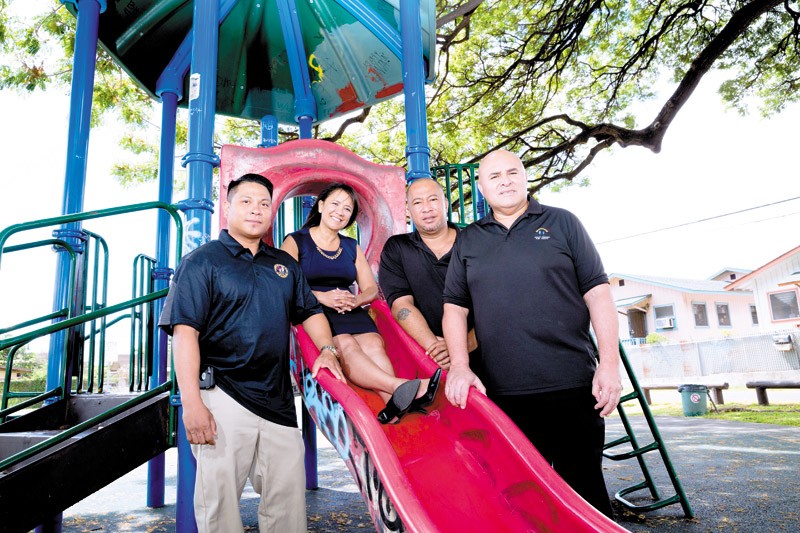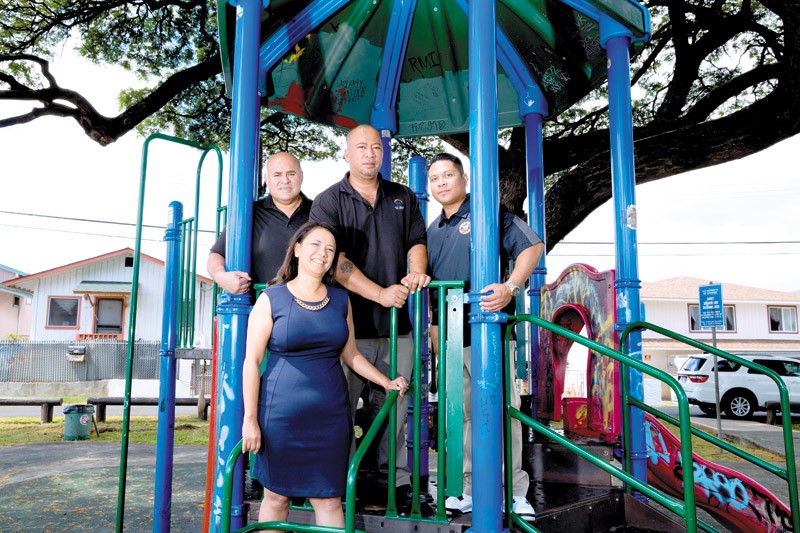Gangbusters

Adult Friends for Youth’s (from left) Rowel Yasay, president and CEO Deborah Spencer-Chun, Malakai Maumalanga and vice president Mac Schwenke at Kanoa Park in Kalihi
Street gangs were romanticized in the Broadway musical West Side Story. The 1950s hit show depicted the rivalry between the Jets and the Sharks, two teenage street gangs of different ethnic backgrounds. During its stage and film fame, West Side Story received critical and commercial acclaim, accompanied by extensive media coverage about gang warfare that kept the show’s plot timely.
Audiences went home singing, “Juvenile delinquency is purely a social disease.”
Fast-forward to today, and communities still are coping with that social disease. In fact, youth gang problems are proliferating across the nation. The racial/ethnic composition of gangs is changing, and gangs are becoming more organized. According to U.S. Department of Justice, most gang violence is related to conflicts with other gangs.
Yet progress is being made in developing comprehensive programs that combine prevention, social intervention and rehabilitation, and suppression of gang violence.
Gee, Officer Krupke, tell us more.
Hawaii has a model organization and approach to gang therapy that is a shining guiding light. Adult Friends for Youth (AFY) and its magic elixir should be bottled and exported.
Limelight on this empowering community force comes as it celebrates 30 years of redirecting troubled youths from gang violence to becoming educated, productive citizens.
With an 80-90 percent success rate, it bears closer examination, especially at a time when violence and terrorist threats have become benchmarks of an American lifestyle.
Dear Officer Krupke, we’re down on our knees.
With AFY’s unique redirected therapy approach, one throws out the books on traditional authority-heavy and lock-them-up anti-gang tactics. Programs are designed to stop violence and anti-social behaviors while increasing educational achievement.
Since 1986, AFY has been a pioneer and innovator in gang prevention and intervention, redirecting children and adolescents from lives of violence and destructive behavior.
“AFY redirects young people from poor choices to better ones, and offers love and hope,” says AFY president-CEO Deborah Spencer-Chun.
She and her social work associates defuse gang activities in schools and low-income neighborhoods, inspiring dropouts to earn high school diplomas with the help of supportive tutors.
Education reigns supreme in their arsenal of relationship-building and redirecting tools. Their unique approach is to work within gangs to make long-term change.
That’s right, they assimilate into gangs to build trust in a peer-to-peer encounter. Labels and being judgmental have no place in their practice.
AFY director of redirectional therapy Malakai “Mo” Maumalanga, a former gangster, explains, “We plant the seed to change the mindset. The strength of working with the group is to find new ways to cope with issues, so they don’t have to punch guys out. Once you get them to commit to change, they’ll do it because they’ve given their word.
“We approach gang members at intermediate school and follow them through high school,” he says.
Maumalanga’s turnaround from gang member to social worker with an advanced degree is testimony to his commitment and philosophy.
While skeptics dash most recidivism stories, Maumalanga walks the walk as an advocate and role model. He is The Rock of local social work.
But there are those in denial about the presence of gangs in our community. Like the vagrants who litter our sidewalks, we cower in the belief that what we don’t know won’t hurt us.
A 2010 gang assessment reported 129 street gangs involving about 500 members across the state. “The problem is hidden from public view,” Spencer-Chun says.
At one high school alone, 20 different gangs were identified on campus. At another, more than half of the student body admitted to being gang-related.
“People in authority think gangs are powerful as a group and attempt to break them up to weaken their ranks,” she states. “That’s counterproductive.
“Loyalty is a strong force in the gang cult. Members continue to be friends into adulthood,” she explains. “Why tamper with the one attribute that provides pride and security to a troubled youth?”
Founded by Sidney M. Rosen in 1985 at University of Hawaii School of Social Work, AFY began as a volunteer mentoring program for at-risk children and adolescents. Eventually, the organization was incorporated as a nonprofit and has been independent of UH since 1987.
AFY has a proven record of success. According to Spencer-Chun, they work with about 400 kids a week, ranging in age from 13 to 18, and can boast a success rate of around 80 percent. It is estimated AFY has successfully changed the attitudes and behaviors of more than 30 gangs, helping most members integrate into the social mainstream as productive members of the community.
This boy don’t need a judge, he needs an analyst’s care!
“These clients need long-term psychotherapy rather than short-term counseling,” says AFY vice president Mac Schwenke, who has worked with Spencer-Chun for 23 years.
Rowel Yasay, former student and 2007 Young Person of the Year, recalls being approached by AFY in his freshman year.
“I was nervous at first,” he says. “I was clueless about AFY. ‘Who are these people?’ I thought. But that’s them … they keep penetrating that wall.”
He adds, “They are very open. They listened to our problems. Relationship and trust built up slowly. They steered me off the wrong path, and it was a fun ride as a group.”
Today the father of two young sons is giving back to AFY by offering his testimony and services when needed.
“That’s when you know they’ve turned a corner,” Spencer-Chun points out. “They pay it forward to be a role model for others.”
But the road to recovery, like most rebuilding processes, is lined with benchmarks of self-realization, self-determination and courage to change. It’s not easy re-establishing self-worth where none existed.
Disadvantaged and embattled kids are prone to self-destruction. They face the same hopeless outlook every day of their lives, according to Schwenke. Many don’t believe they will survive gang battles and turf wars, ending up in prison or death.
This is a dismal faith that rants on one’s negative psyche.
It’s just our bringin’ upke that gets us outta hand.
“We’ve had court cases where it is ruled that as a condition of probation one has to say away from the gang,” Spencer-Chun relates. “We have had to educate law enforcement and judicial officials that one’s gang is often the only safe haven from life’s challenges. To alienate them from that secure environment can be toxic.
“We’re not harboring fugitives,” she emphasizes. “We hold our clients very much accountable for their actions.
“By doing so, we can impact families and generations,” she says hopefully.
“Sometimes parents expect immediate results. I tell them, hey, you’ve had them for 15 years, give me a little more time!”
Maumalanga underscores that point, saying, “One has to feel connected to make change. It’s easier to do harm when you’re not connected. Now I can’t imagine hurting somebody because I feel connected to everyone and everything. That’s the goal of our program.”
It’s a process.
As society searches for answers to counteract violence and destruction in our schools and other public places, AFY’s self-actualization methods based on the humanistic approach of American psychologist Carl Rogers are gaining attention. Its local methodology used by AFY founder Rosen and advocate Spencer-Chun has national experts looking to Hawaii for answers.
“Our goal is to go national,” Spencer-Chun says. “We want to be part of the solution. We have an answer to gang violence. We know how to take away barriers and stereotypes.”
The diversity and cultural mix of Hawaii’s population also add muscle to the program.
As with all well-meaning programs, awareness and funding are leverages to success. AFY’s annual fundraiser Nov. 25 is an opportunity to bring light and traction to the issue.
“Not only will it be a time to salute 30 years of AFY achievement,” Spencer-Chun says, “but, as with redirectional therapy, it’s an occasion to bring people together to celebrate individual empowerment and self-worth.”
And as the Jets and the Sharks did in West Side Story‘s big dance number, it’s time to kick up your heels and feel good to be alive.
Gee, Officer Krupke, thank you!
Join the Adults Friends for Youth gang at the Judie Rosen 30th anniversary Celebration of Youth dinner-auction Friday, Nov. 25, at 4:30 p.m., at Sheraton Waikiki, Hawaii Ballroom. Black tie optional. Silent auction of 400 items. Featuring headliner Frank De Lima and auctioneer Tony Silva of Da Bruddahs. Tickets: 833-8775 or afyhawaii.com.







